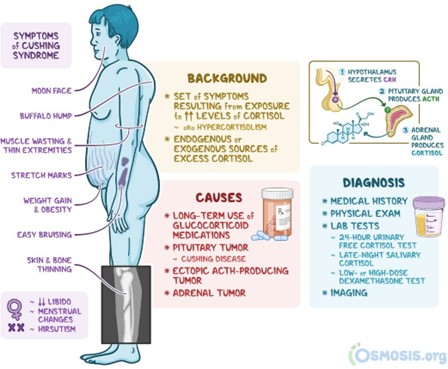A patient with suspected acromegaly is seen at the clinic. To assist in making the diagnosis, which question should the nurse ask?
"Do you have to wear larger shoes now?"
“Are you experiencing tremors or anxiety.”
“Is there any family history of acromegaly?”
"Have you had a recent head injury?"
The Correct Answer is A
acromegaly typically causes an enlargement of the hands and feet. The nurse can inquire if the patient has noticed any changes in shoe size, as this may indicate abnormal growth.
"Are you experiencing tremors or anxiety" is not directly related to acromegaly, and although anxiety can be associated with some medical conditions, it is not a typical symptom of acromegaly.
"Is there any family history of acromegaly?" is also a relevant question, as acromegaly can be caused by a genetic disorder. If the patient has a family history of the condition, this may increase their risk of developing it.
"Have you had a recent head injury?" is not specifically related to acromegaly, although head trauma can cause a variety of medical conditions.
Overall, option a. is the most relevant question to ask a patient with suspected acromegaly.


Nursing Test Bank
Naxlex Comprehensive Predictor Exams
Related Questions
Correct Answer is B
Explanation
This response acknowledges the patient's concerns and provides reassurance that the changes are temporary and will improve after surgery. Response is dismissive of the patient's concerns and may make the patient feel unheard. Response c may be helpful, but it does not address the patient's emotional concerns. Response d is not accurate because the patient has expressed feeling awful about their appearance.


Correct Answer is C
Explanation
The correct answer is choicec. The cobalamin injections will prevent me from becoming anemic.
Choice A rationale:
Cobalamin (B12) injections do not increase hydrochloric acid production in the stomach.Chronic atrophic gastritis often leads to decreased production of hydrochloric acid due to the loss of parietal cells, but B12 injections do not reverse this condition.
Choice B rationale:
The need for cobalamin injections is typically lifelong in patients with chronic atrophic gastritis because the condition leads to a permanent loss of intrinsic factor, which is necessary for B12 absorption. The injections are not just until the stomach heals.
Choice C rationale:
Chronic atrophic gastritis can lead to vitamin B12 deficiency due to the loss of intrinsic factor, which is essential for B12 absorption.This deficiency can cause pernicious anemia, and B12 injections are necessary to prevent this condition.
Choice D rationale:
While chronic atrophic gastritis does increase the risk of stomach cancer, B12 injections are not specifically aimed at reducing this risk.The primary purpose of B12 injections is to prevent anemia.
Whether you are a student looking to ace your exams or a practicing nurse seeking to enhance your expertise , our nursing education contents will empower you with the confidence and competence to make a difference in the lives of patients and become a respected leader in the healthcare field.
Visit Naxlex, invest in your future and unlock endless possibilities with our unparalleled nursing education contents today
Report Wrong Answer on the Current Question
Do you disagree with the answer? If yes, what is your expected answer? Explain.
Kindly be descriptive with the issue you are facing.
